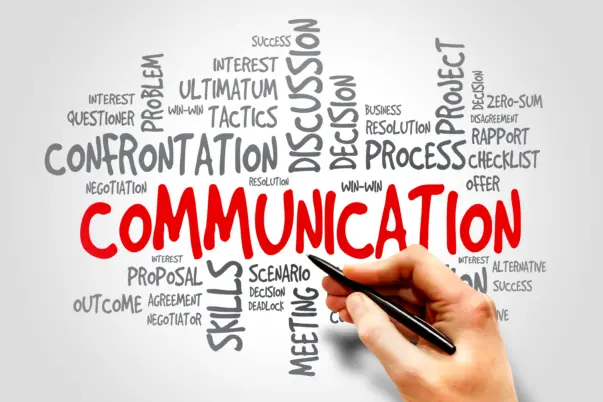Self-awareness is the Key to Communication Skills
By Corporate Education

Becoming aware through your communication skills: we can all agree that communication is the key to any relationship, whether it’s professional, business, or intimate. But what exactly are those communication skills, and why do they matter?
They matter because these are the different ways we interact with others and build relationships every day. Our ability to grow in these skills is the result of our self-awareness.
After reading 10 Communication Skills for Your Life and Career Success, I identified four main types of communication: verbal, nonverbal, visual, and written. Below are the top 10 communications used in these 4 types of communication. How often do you use these skills and how aware are you of them?
The 10 top communication skills:
- Active listening.
- Communication Method.
- Friendliness.
- Confidence.
- Sharing Feedback.
- Volume and Clarity.
- Empathy.
- Respect.
- Non-verbal cues/Body language.
- Responsiveness.
In my career, I have identified which communication skills I am good at and which I am not. As a good leader, it is essential to know this. Especially when you supervise others, you want to get the right message across. Good communication allows you to build trust, and when your team trusts you, they start to learn from you.
Becoming aware
How well do you communicate and what are you teaching your team? Let’s reflect on this question.
Think about your behaviors while having a conversation: your body language, active listening, volume and clarity, etc. If you were busy with something when your team member came up to you, did you ask them to give you a moment so you could give them your attention? What type of conversation was it? Did you give them the appropriate attention? Was it a sensitive topic or was it a casual conversation? Ask yourself what the other person was doing. Did they look nervous? Were they also making appropriate eye contact? Was their body position facing you? Paying attention to these cues can tell you a lot about the type of conversation, allowing you to adapt accordingly.
Non-verbal skills
When it comes to non-verbal cues, I pay attention to them often. Others’ non-verbal cues indicate how actively they are listening. I do this to identify cues on how the other person is truly feeling. If someone makes a face of confusion, there is your cue to ask if something needs clarification. Maintaining eye contact in a conversation can express how much attention is being received or given.

When I am not able to give them eye contact, I let them know. A simple, “Sorry, I am not looking at you, I’m just finishing this up. But I am listening”, gives the other person clarification that they are not being ignored. Body language tells you a lot of the conversation that is not being verbally said.
Confidence skills
I recognize that I need more practice in building my confidence, and in my professional environment, I tend to be nervous about presenting a new idea or new ways of doing things. This has nothing to do with my ability but with my thoughts about preconceived ideas others may have about me.
Confidence is important when presenting new ideas for a project. Showing others your confidence gives them the confidence to trust your judgment and abilities. Although I am still in the process, I have learned that to feel more confident in myself I need to prepare by making sure I am knowledgeable enough about the topic to communicate the correct importance. This includes preparing for questions others may have for me.
Volume and clarity skills
When it comes to volume and clarity, I come to find that I need to slow down and explain with clarity. There are times when I introduce topics as if others will automatically understand what I am talking about. I need to share more details about the topic first, for others to fully understand the situation. Being confident can help me build clarity in my speech so that whatever I am presenting is done smoothly. If I prepare more, I’ll be more clear, and I’ll be able to answer questions before they are even asked. Knowing my audience will always be a contributing factor in knowing how to get through them.
Of course, evaluating yourself is only surface-level work but it is where many employees need to start if they want to have an impact in their work environment. At Corporate Education (Corp Ed) we understand that there are great employees who need simple upskilling to move up their career ladder. Communication skills are treated as if they come naturally to us. But in the real world, we learn our communication skills mostly from the people around us, and in this case, our work leaders. How well can you recognize what you are good at and what needs practice? Corp Ed invites you to visit our page and explore the different training opportunities we can provide.
Contact us:
253-583-8865 | corporate.education@cptc.edu | cptc.edu/corporate-education